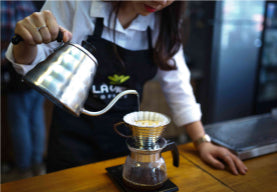

Sacred Acre - Korongo
This coffee is an Tanzanian blend that is sweet, nutty, and citrusy. It makes a great pour-over and French press!
Sacred Acre Korongo is sourced from a network of washing stations from the Mbozi, Mbeya, and Mbinga regions of Tanzania. Cherries are hand-picked and processed on individual farms before being exported to Southern Tanzania for export.
Tanzania has a long coffee-growing history, with roots tracing back to the Haya tribe in the 16th century. Throughout the years, the Tanzania coffee industry has evolved to improve coffee production; and Sucafina Tanzania continues to invest in improving the coffees and lives of smallholder farmers in their communities.
About the Beans
Type
Blend
Origin
Indonesia, Papua New Guinea
Varietal
Blue Mountain, Bourbon, SL28, Typica
masl
1600 - 1900
Region
Mbozi, Mbeya, Mbinga
Producer
Smallholders
Process
Washed








